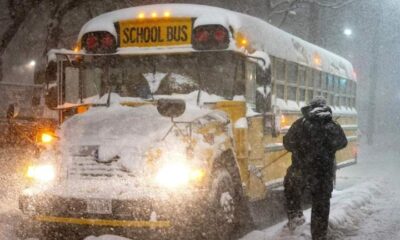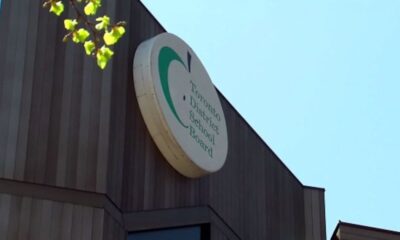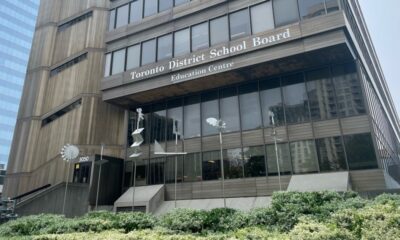Education
Toronto Schools Split Over Lottery Admissions: Debate Intensifies

The Toronto District School Board (TDSB) implemented a lottery system for specialty school admissions in 2022, sparking a heated debate among students, parents, and educators. Critics argue that this change has adversely affected program quality and school spirit, while supporters claim it promotes fairness and equal opportunity.
Attendance at student clubs at Marc Garneau Collegiate has significantly declined, according to Grade 12 student Victor Jiang, who is part of the school’s TOPS program focused on math and science. He believes the shift is a direct result of TDSB’s decision to eliminate merit-based admissions. Jiang asserts that the lottery system has “drastically” altered specialized programs, diluting the curriculum and diminishing student engagement. “It profoundly hurts the student community,” says Jiang, who also serves as a TDSB student trustee.
As the board prepares to update its controversial admissions policy, applications for the upcoming academic year are set to open in November. The TDSB has not provided further comments on the ongoing situation. Many stakeholders are advocating for the elimination of the lottery, citing increased dropout rates and a failure to achieve the promised diversity.
Historically, admission to TDSB’s specialty programs was based on merit, requiring auditions, exams, and portfolios. The shift to a centralized Student Interest Programs policy in 2022 aimed to create more equitable access, with random selection for oversubscribed programs. Priority was given to under-represented students, including Indigenous applicants and 20 percent of seats for Black, Latin American, and Middle Eastern students. Additionally, half of the spots in math, science, and technology programs were reserved for girls.
Ayan Kailie, whose daughter is in Grade 11 at Etobicoke School of the Arts (ESA), supports the lottery system. She contends that it provides opportunities for talented students from lower-income families. “I had to choose between putting food on the table or buying brushes and canvases,” Kailie explains, emphasizing the importance of financial equity in education. Her daughter, described as “thriving” at ESA, might not have gained admission under the previous merit-based system.
Despite some support for the lottery, others, like Patricia Warnock, head of the music-theatre program at ESA, are calling for a return to merit-based admissions with equitable measures. Warnock notes that even before the lottery, ESA made efforts to increase accessibility, such as redesigning audition processes and offering free workshops. However, she criticizes the board for prohibiting outreach efforts aimed at encouraging applications from diverse backgrounds.
Reports of rising dropout rates have surfaced since the lottery’s introduction. At ESA, nine Grade 9 students transferred out last year, a sharp increase from just one in 2019-20. Furthermore, the Grade 11 musical theatre class has seen a decline in enrollment, from 44 students to 35 since the transition to the lottery system. Warnock attributes this trend to a mismatch between students’ interests and the programs in which they are enrolled.
In the context of the lottery’s intended diversity goals, Warnock expresses skepticism. She observes that more middle-class students from nearby neighborhoods are now attending ESA, contrasting with the previous trend of students travelling across the city to apply. While Warnock believes that the curriculum remains intact, she acknowledges a broader range of skill levels among incoming students.
The sentiment at Rosedale Heights School of the Arts echoes these concerns. Grade 12 student Hailey Jackson has witnessed a decline in school spirit, noting that events like Halloween Week are less vibrant than in previous years. Jackson, who has been involved in the school newspaper, also points out a decrease in LGBTQ representation, which she believes has affected the school’s culture.
“Under the old system, we could advocate for students who would benefit from the inclusive environment,” Jackson explains. She prefers a merit-based approach, arguing that equity can still be achieved within that framework. The lack of auditions, she warns, risks excluding students who genuinely belong in specialized programs.
Michael Danishevsky, co-chair of the parent council at William Lyon Mackenzie Collegiate Institute, is vocally critical of the lottery. His son participates in the school’s MaCS Program for enriched math, science, and computer technology. “The last three years were a failed experiment,” he asserts, citing lowered academic standards and increased dropout rates as major issues.
Danishevsky recently collaborated with University of Toronto economist Marcin Peski to analyze the lottery’s impact on math contest outcomes. Their report, published by the advocacy group Save Our Schools, reveals that TDSB performance declined following the implementation of the lottery. In 2024, four TDSB schools ranked among the Top 20 in the Grade 10 math contest, but by 2025, none made the list. “The only explanation consistent with the evidence,” the report concludes, “is that the lottery admissions policy itself materially weakened student performance.”
As the TDSB prepares for its upcoming policy review, the debate over the lottery admissions system continues to evoke strong opinions. Students, parents, and educators remain divided over the best approach to ensure equitable access to specialty programs without sacrificing quality or engagement.
-

 Politics4 weeks ago
Politics4 weeks agoSecwepemc First Nation Seeks Aboriginal Title Over Kamloops Area
-

 World5 months ago
World5 months agoScientists Unearth Ancient Antarctic Ice to Unlock Climate Secrets
-

 Entertainment5 months ago
Entertainment5 months agoTrump and McCormick to Announce $70 Billion Energy Investments
-

 Science5 months ago
Science5 months agoFour Astronauts Return to Earth After International Space Station Mission
-

 Lifestyle5 months ago
Lifestyle5 months agoTransLink Launches Food Truck Program to Boost Revenue in Vancouver
-

 Technology3 months ago
Technology3 months agoApple Notes Enhances Functionality with Markdown Support in macOS 26
-

 Lifestyle3 months ago
Lifestyle3 months agoManitoba’s Burger Champion Shines Again Amid Dining Innovations
-

 Top Stories2 months ago
Top Stories2 months agoUrgent Update: Fatal Crash on Highway 99 Claims Life of Pitt Meadows Man
-

 Politics4 months ago
Politics4 months agoUkrainian Tennis Star Elina Svitolina Faces Death Threats Online
-

 Sports5 months ago
Sports5 months agoSearch Underway for Missing Hunter Amid Hokkaido Bear Emergency
-

 Politics5 months ago
Politics5 months agoCarney Engages First Nations Leaders at Development Law Summit
-

 Technology5 months ago
Technology5 months agoFrosthaven Launches Early Access on July 31, 2025





















